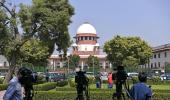Judges are supposed to act in a manner that is "unencumbered" by popular morality while deciding constitutional and legal questions, Chief Justice of India DY Chandrachud has said.

The CJI on Wednesday was speaking at the Bhutan Distinguished Speakers' Forum, a part of the Jigme Singye Wangchuck Lecture Series, on the subject of Judicial legitimacy through accessibility, transparency and technology: the Indian experience.
He also spoke on the credibility of judiciary and the "institutional trust" bestowed in courts.
The 50th CJI said institutional trust in courts and their credibility was the very basis of a thriving constitutional order and the courts did not directly hold resources as trustees of people.
"Public trust is central to the credibility of the judicial branch which is otherwise insulated from public opinion in its operations -- as it must be. The Indian Supreme Court prides itself in being the people's court," the CJI said.
Judiciary on several occasions questioned the distributional fairness of state largesse such as contracts and natural resources by other wings of the government, he added.
He further opined that though as public functionaries, courts were vested with the responsibility to give effect to equity, these judicial bodies were not directly in charge of the manner in which resources were to be distributed.
"It does, however, fall upon us to adjudicate the fairness of that distribution, should it be questioned," added the CJI.
Distinguishing between the role of the political executive and the judiciary, he emphasised that at the level of the trial courts, judicial officers were trained to apply the letter and the spirit of the law with clinical detachment from the popularity of their decisions.
"Judges are supposed to act in a manner that is unencumbered by popular morality when deciding Constitutional or legal questions," he said.
According to the CJI, it was in that sense that neither the appointment, nor the continuity of judges was determined by the popular mandate enjoyed by their decisions.
"In fact populist decision-making sits rather uncomfortably on the sinewy shoulders of judicial independence," he said.
Highlighting the importance of transparency, CJI Chandrachud said sunlight was not only the best disinfectant but also begets public trust and helps keep the house in order and serves as an internal check on the functioning of the courts across the country.
"It ensures that our institutions are better-managed and use their resources effectively," he said, adding that measures such as live-streaming of court proceedings have helped foster internal efficiency, accountability and institutional stability.
He also referred to the concept of Public Interest Litigation jurisdiction in India and said it became a unique part of the nation's constitutional order, which was co-opted by several other jurisdictions.
"Substantive outcomes are only a part of the courts' accountability. Judicial institutions are assessed by the people based on substantive metrics such as consistency of outcomes and adherence to constitutional values of equity, fairness and justice," he said.
Pointing out that not only judicial decisions but also the roads leading up to them, must be transparent, navigable by everyone with or without a legal education and must be broad enough to accommodate everyone, the CJI said India has been using technology to counter barriers to accessibility to the courts.
"The perceived fairness of our decisions as well as the ease of obtaining them are important. Justice must not only be done but must be seen to be done. Outcomes are rarer than process-stuck people in the courts. Thus, not only the constitutional outcomes but the constitutional journeys matter. Open courts, accessible courts are a crucial part of the mission. Technology and simpler processes will be key to these journeys,” he said.
The CJI also referred to hybrid hearings in courts and said they were introduced in order to tackle COVID-19-induced nationwide lockdown and now, are a feature of Indian courts.
"Virtual Courts and video-conferencing have helped us overcome the massive geographical limitation faced by our litigants from smaller pockets of the country. Also, persons with physical impairments, pregnant women, and persons in their advanced years can now access the courtroom virtually," he said.
The CJI also said that technology is not a one-stop panacea for all social inequalities but the country must not shy away from tech-enabled measures that further judicial accountability.











 © 2025
© 2025